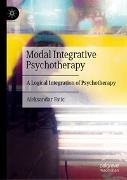Read more
The book addresses the growing interconnectedness between philosophical counseling and traditional psychotherapy. It explores the organic links between core philosophical concepts and theories, and the corresponding problems and theories in psychotherapy. Aleksandar Fatic focuses on the use of modal logic as a foundation for psychotherapy within the proposed Modal Integrative Psychotherapy model. The book functions both as a research work and a manual for the development and application of integrative psychotherapy, viewed through the lens of philosophical counseling and the exploration of the logical underpinnings of psychotherapy as its conceptual foundation.
List of contents
Chapter 1. Introduction.- Chapter 2. Normalcy and other key concepts.- Chapter 3. The subject of psychotherapy: Nominalism and realism in understanding psychic processes.- Chapter 4. The context of psychotherapy: The geometry of motivation.- Chapter 5. Linguistic pragmatics in psychotherapy.- Chapter 6. Interventions in Modal Integrative Psychotherapy.- Chapter 7. Modal Integrative Psychotherapy and the culture of trauma.- Chapter 8. Conclusion.
Summary
The book addresses the growing interconnectedness between philosophical counseling and traditional psychotherapy. It explores the organic links between core philosophical concepts and theories, and the corresponding problems and theories in psychotherapy. Aleksandar Fatic focuses on the use of modal logic as a foundation for psychotherapy within the proposed Modal Integrative Psychotherapy model. The book functions both as a research work and a manual for the development and application of integrative psychotherapy, viewed through the lens of philosophical counseling and the exploration of the logical underpinnings of psychotherapy as its conceptual foundation.

